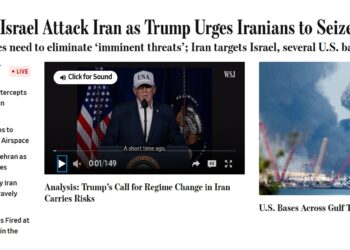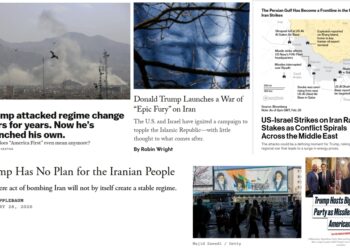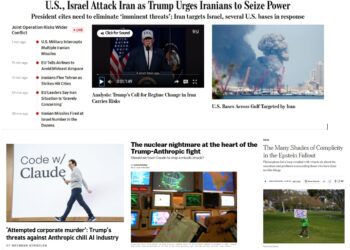 If there is reason to intervene in Libya, there are just as compelling reasons to intervene in Bahrain and Saudi Arabia. Bahrain’s Sunni Emir rules a population vastly Shia. The Saudi monarchy uses a heavy boot to quash any Shia opposition. National interests? Here’s your national interests at work.
If there is reason to intervene in Libya, there are just as compelling reasons to intervene in Bahrain and Saudi Arabia. Bahrain’s Sunni Emir rules a population vastly Shia. The Saudi monarchy uses a heavy boot to quash any Shia opposition. National interests? Here’s your national interests at work.
Every time I passed a former British outpost on Bahrain, I wondered if it would be an Iranian or Chinese officer who would one day have that same uneasy feeling passing a former American outpost. That day may be coming sooner than ever imagined. The subject of representative government in nations such as this always drew the ire of Gulf Cooperative Council (GCC) officers when it arose in seminar discussions at the Joint Forces Staff College or at conferences in Tampa; never raised on host country terrain. Bahraini officers would rankle at the suggestion that the population was majority Shia (it is upwards of 80%; “but no “official” statistics are available,” they would argue). I was there two years and lived across the road from third country nationals living in stables and down the street from Shia neighborhoods much larger and more Spartan than my Sunni area quarters.
In private, the Emir (today’s Emir’s father) scoffed at Shia affectations such as the “Tree of Life” out in the desert and joked about cutting it down. This widely held Sunni attitude left Shia connections to relatives and business partners in Iran as their most cordial. The dialect spoken in the streets was “Gulfy” rather than the more formal Saudi version and far from the Egyptian and Levantine. There was a nascent insurgency held at bay by a heavy handed hired gun; a retired British general, veteran of the Malay success. But there is so much time and just so many prison cells; they cannot contain all the disgruntled forever. And now, the disaffectation has spilled into the streets. Fine to turn a blind eye in Saudi and Bahrain, but not in Libya?
None of this is easy. If it were, simpletons like Sarah Palin could rule the world. It isn’t always fair. If it were, asses wouldn’t find themselves resting atop riches while innocents suffer. Just what is necessary for survival? What we must decide is what it is we value enough that we will expend our own treasure on it. The trade-offs are never simply quid pro quo. But when we choose that the welfare of someone outside of our nation is valuable enough for sacrifice, understand the consequences to those inside our nation. There is no way to know how much is enough for national defense until there is not enough. There is no way to know how much good could be done domestically with the unnecessary billions poured into defense. But there is a rational rigor to prioritization. Every time we decide that action outside our borders is more important than inside, we make a choice that has consequences. Is relieving the suffering of Libyans worth the cost of failing to ameliorate domestic suffering or demonstrating hypocrisy?
Last week Donald Trump told a “conservative” radio personality that the American soldiers in Saudi Arabia were there to protect the oil. Well, there are no American forces in Saudi Arabia and the oil is going to be there and for sale no matter who is running the show unless trade sanctions cripple the industry. The relationship with the Saudi monarchy is more about maintaining the status quo than maintaining the flow of oil. But that status quo is daily becoming as objectionable or more than the Libyan situation. Now our investment in the status quo, particularly in Bahrain, places our ability to sustain an effective military presence in the region more and more at risk. That investment in the status quo translates to hypocritically siding with the oppressors in one location while taking a contradictory position in another.
Saudi Arabia and Bahrain are close to drawing us into a kinetic conflict with Iran (which cannot be amused at the treatment of Shia in either location) while the GCC wants us distracted elsewhere. That is the cost of the status quo there. No matter what we do in Libya, it isn’t going to pay that bill. And it is another bill added to those that the Tea Partiers will use to justify eroding away each and every domestic program until there are none. They would tilt at Muslim windmills to the very last “government school” dollar. The irony is that our defense of oppressive regimes may be the catalyst for action against Iran whose interest it is to relieve the oppression of the Shia population; something on principle we should support. Nothing like successfully working us against ourselves both domestically and internationally.



![[UPDATED with Official Announcement] Audio: VA Del. Dan Helmer Says He’s Running for Congress in the Newly Drawn VA07, Has “the endorsement of 40 [House of Delegates] colleagues”](https://bluevirginia.us/wp-content/uploads/2026/02/helmermontage.jpg)














